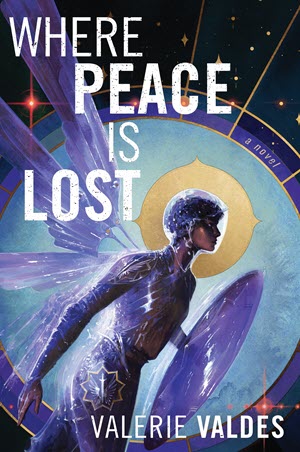Where Peace is Lost
 Valerie Valdes has become one of those writers whose work I snap up as soon as it is published. The blurb on the back of Where Peace is Lost describes it as “cozy space fantasy”, but that’s just marketing. This is not cozy in the same way as a Travis Baldree novel is cozy. This is space opera with very real stakes and cozy only in that it has a happy(ish) ending.
Valerie Valdes has become one of those writers whose work I snap up as soon as it is published. The blurb on the back of Where Peace is Lost describes it as “cozy space fantasy”, but that’s just marketing. This is not cozy in the same way as a Travis Baldree novel is cozy. This is space opera with very real stakes and cozy only in that it has a happy(ish) ending.
The book is set in the aftermath of an interplanetary war. An empire known as the Prixori Anocracy, known colloquially as the Pale, has emerged triumphant. There was a peace settlement of sorts, but the Pale are well aware of their dominant position and have largely ignored its terms as they continue to consolidate their hold on the galaxy. Those who fought against them and survived have gone into hiding.
One such person is Kel Garda. She has settled on Loth, a planet so poor and remote that the Pale haven’t bothered to annex it. But they did build a military base on the planet during the war, and that base is still full of robot war machines. As the book begins, we learn that one of the largest of those war machines has become active, and is heading for a region of Loth that has significant economic importance. If it is not stopped, it could wreck the planetary economy. No one on Loth has a hope in hell of stopping it.
Well, not quite no one. But there is a bounty on Kel’s head, and if she unleashes the weaponry she has at her disposal to destroy the Pale war machine, people will notice. And then the Pale will descend on Loth in force, and not stop until Kel and everyone who helped her is dead.
So here we have a very real moral dilemma. Whatever Kel does, it seems that her new friends and neighbours are doomed. And along the way, we also have some interesting commentary about robot war machines. Unlike the machines that the Empire uses in Star Wars, the machines that the Pale uses are entirely automatic and run by not-very-intelligent AIs. Their sole purpose is to wreak as much havoc as possible. Machines like that, albeit on a much smaller scale, are being designed and built right here on Earth, right now.
Fortunately for Kel, help arrives in the shape of a pair of travelling mercenaries, Captain Savaelia Vyse and her bodyguard, Dare (a man who bears a close resemblance to Geralt of Rivia). They offer, for a reasonable price, to dispose of the war machine. The local authorities on Loth are keen to accept, but naturally wary. They insist on sending a couple of their own people along on the mission as guides. Thanks to an enthusiastic but naïve local called Lunna, Kel finds herself part of the expedition.
The rest of the book is about how the job gets done. There is much adventuring along the way, including fighting some deeply unpleasant bad guys. We also learn a lot more about Kel, and about her new traveling companions. There is some nicely complex plotting of the sort we’ve become used to in Valdes’ previous work. And, as I noted, there is a happy ending.
There is also, because this is space opera, a small amount of serious sensawunda.
Before signing off, I should make mention of the book’s title. It comes from a short prayer associated with what one might describe as an order of religious knights who fought against the Pale. It goes as follows:
Where peace is lost, may we find it.
Where peace is broken, may we mend it.
Where we go, may peace follow.
Where we fall, may peace rise.
Where Peace is Lost is a book about the dilemma of the professional soldier who wants to fight for peace, but knows that she is a violent killer. And that violence is sometimes necessary. I’ll leave you with the following quote:
Violence is always a failure. […] Fear is eager to rationalize and defend it, but make no mistake, it is always a failure. The challenge is not in avoiding failure, but in knowing which failures cannot be avoided.
So yes, punching people is always bad, But sometimes you have to punch Nazis.

Title: Where Peace is Lost
By: Valerie Valdes
Publisher: Harper Voyager
Purchase links:
Amazon UK
Amazon US
Bookshop.org UK
See here for information about buying books though Salon Futura